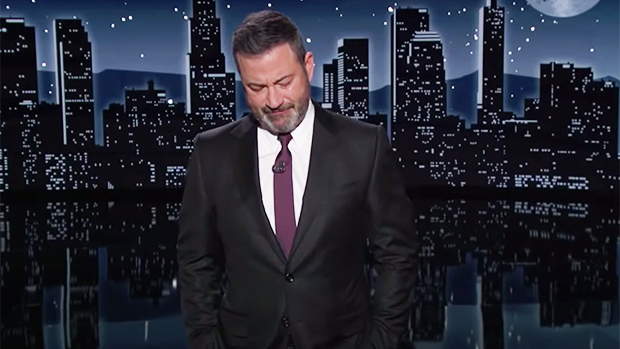Jimmy Kimmel, the late-night comedian who has been a fixture of American television for over two decades, shocked audiences by announcing the abrupt end of his flagship show, Jimmy Kimmel Live! But it wasn’t just the cancellation that stunned millions. On live television, with his voice cracking and tears in his eyes, Kimmel delivered a message that echoed across the nation: “I’m moving to Canada and will NEVER come back!”

The internet erupted within seconds. Hashtags like #KimmelGoodbye, #MovingToCanada, and #WhatHappenedJimmy surged to the top of trending lists. Fans flooded social media with confusion, heartbreak, and wild speculation about why one of America’s most recognizable TV personalities would suddenly walk away. While many assumed it was a political outburst or a sign of burnout, insiders suggest something far more personal is behind the decision.
:max_bytes(150000):strip_icc():focal(999x0:1001x2)/Jimmy-Kimmel-db432376425b4b04a35852ec4fbd70b9.jpg)
For 22 seasons, Jimmy Kimmel Live! entertained millions with a mix of comedy, celebrity interviews, and viral pranks that became part of American pop culture. Kimmel was known for his sharp wit, emotional monologues, and iconic segments like “Mean Tweets.” So when he looked into the camera and said goodbye—not just to Hollywood, but to America itself—the studio audience sat in stunned silence. “People gasped,” one producer said. “Some thought it was a joke. But when they saw the tears, they knew it was real.”
:quality(75)/jimmy_kimmel_tro_lai_song_truyen_hinh_sau_khi_bi_dinh_chi_ece74ce810.jpg)
ABC cited “creative exhaustion” and Kimmel’s desire to “spend more time with family” as the official reason for the show’s cancellation. But rumors quickly spread about a deeper internal struggle. Sources close to Kimmel say he’s been battling a growing disconnect between his public persona and private reality. Though the late-night stage gave him a platform for political commentary, friends say he’s felt increasingly trapped, disillusioned, and anxious about the future of American media. One insider explained, “Jimmy feels like America isn’t the same country it was when he started. He’s tired of the division, the hate, and the constant spotlight. Moving to Canada is his way of escaping before it consumes him.”

Hollywood’s reaction has been mixed. Comedians like Stephen Colbert and Seth Meyers expressed sadness, calling Kimmel’s departure “the end of an era.” Matt Damon, Kimmel’s longtime “frenemy,” tweeted, “I guess the joke’s on all of us. Farewell, my friend.” Meanwhile, critics on the Right celebrated his exit, calling it a win against what they viewed as politically charged late-night television.
Fans were equally divided. Some mourned the loss of a nightly voice they’d grown up with. “It feels like losing a friend,” one fan wrote. Others were less sentimental. “Good riddance,” one critic posted. “Maybe now late-night can finally be funny again.”

Kimmel has remained silent since the announcement. No interviews, no clarifications—just that one haunting promise: “I will NEVER come back.” Whether his move to Canada is permanent or part of a larger plan remains unknown. But one thing is clear: when Jimmy Kimmel walked away, he didn’t just end a show. He ignited a cultural conversation that’s only just beginning.